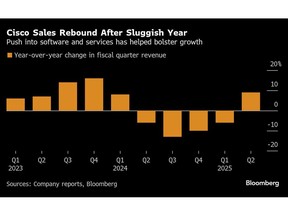Article content
(Bloomberg) — Cisco Systems Inc. gained in late trading after giving an upbeat sales forecast for the current quarter, helped by companies spending more on computing infrastructure to take advantage of AI technology.
Cisco Systems Inc. gained in late trading after giving an upbeat sales forecast for the current quarter, helped by companies spending more on computing infrastructure to take advantage of AI technology.

(Bloomberg) — Cisco Systems Inc. gained in late trading after giving an upbeat sales forecast for the current quarter, helped by companies spending more on computing infrastructure to take advantage of AI technology.
Article content
Article content
Revenue in the quarter ending in April will be $13.9 billion to $14.1 billion, Cisco said in a statement Wednesday. Analysts had predicted a figure at the bottom end of that range.
Advertisement 2
Story continues below
Article content
The company — the largest seller of networking gear — also raised its fiscal 2025 target by about $1 billion to just more than $56 billion. That compared with a $55.97 billion average estimate.
Corporate clients have been bolstering their networking systems to help speed the creation and use of artificial intelligence. The outlook suggests that spending by those customers is helping make up for weaker orders from the federal government, which had put some projects on hold after the change of administration in Washington.
“As AI becomes more pervasive, we are well positioned to help our customers scale their network infrastructure, increase their data capacity requirements and adopt best-in-class AI security,” Chief Executive Officer Chuck Robbins said in the statement.
Cisco shares climbed more than 6% in late trading. The stock had increased 5.5% this year heading into the earnings report.
Cisco’s switches and routers are the key pieces of equipment that direct data traffic in and out of networks and around the internet. The company has also pushed further into software and services, a shift accelerated by last year’s acquisition of the data-crunching business Splunk.
Article content
Advertisement 3
Story continues below
Article content
Product orders rose 29% from a year ago in the fiscal second quarter, which ended Jan. 25. Minus the contribution from Splunk, new orders were up 11%, the company said.
In a separate filing, Cisco said that Gary Steele, president of the company’s go-to-market division, is leaving. The executive, who previously ran Splunk, is taking a CEO job at an unidentified business.
Government Slowdown
Though public sector demand isn’t at levels that Cisco has previously experienced, the weakness is mainly confined to a slice of that market. Cisco gets the majority of its US government business from the Department of Defense and only about 25% from other agencies. It’s those civilian divisions of the government that are ordering less, Chief Financial Officer Scott Herren said in an interview.
During a conference call, executives fielded questions about proposed tariffs on goods imported from Canada, Mexico and China. Analysts asked whether customers were rushing orders now to avoid the possibility of higher prices later.
Cisco downplayed concerns, saying that it learned valuable lessons from the supply crunches of the pandemic. The company now has a more diverse supply chain and uses contract manufacturers with facilities in multiple locations.
Advertisement 4
Story continues below
Article content
That will help the company make adjustments to mitigate the impact of tariffs, Herren said. Raising prices will be the last lever it pulls. The company’s financial projections include the impact of tariffs on costs, he added.
“I feel like we’ve de-risked that,” Herren said.
Recurring Revenue
Sales rose 9% to $14 billion in the second quarter, just above the average estimate of $13.9 billion. The revenue expansion in the period was the company’s first in a year.
Profit climbed to 94 cents a share, minus some items. Wall Street projected 91 cents.
Under Robbins, Cisco has been trying to become less reliant on one-time sales of big-ticket equipment. That company has made headway on that front. Products such as security and remote management tools, which are hosted in the cloud, have helped add billions of dollars in recurring revenue.
Deferred revenue — a sign of future sales — now totals $27.8 billion, the company said. That’s up 8% from a year ago.
The company’s board also approved the addition of $15 billion to its stock repurchase program. That brings the budget for buybacks to $17 billion.
Article content
Comments